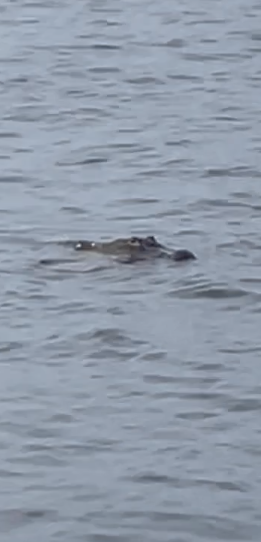Alligator spotted in Washington Park
Published 5:37 pm Wednesday, May 25, 2022

- Washington Park residents submitted a video of an alligator swimming near their pier on Monday evening (May 23)
|
Getting your Trinity Audio player ready...
|
Washington Park residents submitted a video to the Washington Daily News of an alligator swimming close to their pier at around 5:30 p.m. Monday evening (May 23). The alligator was headed toward Haven’s Garden, the residents said. The video can be viewed at www.thewashingtondailynews.com.
The North Carolina Estuarium confirmed reports of alligator sightings near Northshores Drive, earlier this week.
Alligators are an uncommon sight in Beaufort County; however, it is possible to see one in brackish waters, according to North Carolina Wildlife.
“In the southeast, the American alligator inhabits freshwater swamps, marshes, ponds, lakes and the backwaters of large rivers. They have also been observed in brackish water and even on beaches. Adult alligators are usually solitary, but often congregate together, especially in the breeding season,” the NC Wildlife website shares.
“Mating takes place in May through June. After mating, the female alligator begins to build a mound-like nest of leaves, sticks, mud and other debris. The nest, built near water, measures 2-3 feet tall and up to 6 feet in diameter. After approximately 65 days, the young hatch and are about 9 inches long,” according to NC Wildlife.
Last summer, NC Wildlife published an article on coexisting with alligators. They wrote that alligators are roaming southeastern North Carolina in search of food and mates. Alligators spend the winter in brumation – “a long period in which they don’t eat and seldom come out of their dens.”
According to NC Wildlife, alligators “very seldom pose a threat to humans.” However, issues can arise if people feed them either intentionally or unintentionally. “Alligators’ natural behavior is to fear and avoid humans, but being fed by people teaches them to lose that fear and associate humans with an easy meal. For this reason, feeding alligators is a violation of state law.”
“Each year, the Wildlife Commission receives lots of calls from new and lifelong residents, as well as visitors, who are surprised to see alligators in coastal neighborhood ponds and ditches in the spring and summer months. Many of these alligators are just passing through on their way to somewhere else and will likely leave within a few hours or a couple of weeks if left alone,” Alicia Davis, Wildlife Commission’s alligator biologist stated in the article.
Davis’ recommends the following to prevent a dangerous interaction with alligators: “secure pets on a leash and do not allow them to swim, drink, or exercise in or near waters where alligators have been seen, watch young children closely and never leave them unattended near any body of water; practice caution in and around waters where alligators have been seen, especially between dusk and dawn when alligators are most active and refrain from approaching an alligator, no matter its size.”
Davis advises people to be at least the length of a full-size school bus away from young alligators and double the length for adult alligators.
For legal removal of an alligator in situations that require immediate action such as an alligator becoming trapped in a pool or refusing to move from a roadway, call N.C. Wildlife Helpline toll free at 866-318-2401 Monday through Friday 9 a.m. – 5 p.m.





